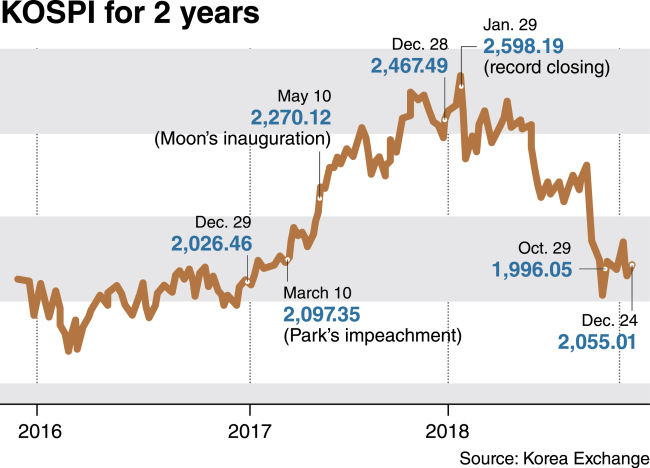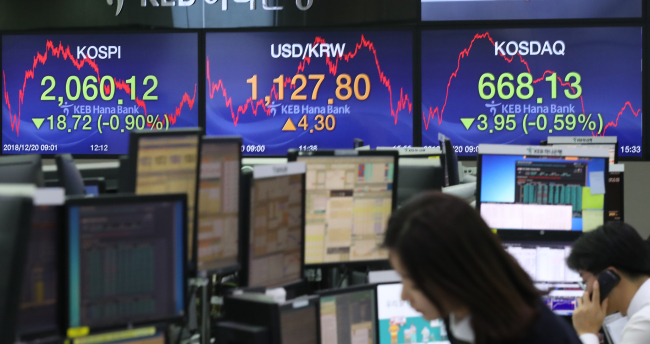[News Focus] Indices unfavorable to Moon’s ‘quality of life’ motto
By Kim Yon-sePublished : Dec. 26, 2018 - 11:36
SEJONG - One month ago, President Moon Jae-in expressed his philosophy that indices for quality of life are more important than gross domestic product growth, during his meeting with Organization for Economic Cooperation and Development Secretary-General Angel Gurria at Cheong Wa Dae.
His remarks have been interpreted among most people that more households should shift focus to leisure activities or shopping on the back of the government’s policy direction toward slashing statutory working hours and raising the minimum wage.
People say the president may have wanted a paradigm change of the long-standing workaholic mindset in so many workplaces in South Korea. However, some commenters label the Moon administration’s policy as “ideal,” in the face of the high jobless rate and sales drop of overall businesses.
The transcript for Moon, who has completed nearly 20 months of his term, does not match with his economic policy for the people’s quality-oriented life.
His remarks have been interpreted among most people that more households should shift focus to leisure activities or shopping on the back of the government’s policy direction toward slashing statutory working hours and raising the minimum wage.
People say the president may have wanted a paradigm change of the long-standing workaholic mindset in so many workplaces in South Korea. However, some commenters label the Moon administration’s policy as “ideal,” in the face of the high jobless rate and sales drop of overall businesses.
The transcript for Moon, who has completed nearly 20 months of his term, does not match with his economic policy for the people’s quality-oriented life.

Financial sector stock prices tell the difficulty in overall industries. The benchmark Kospi fell about 18 percent this year -- from 2,467.49 on the last trading session, Dec. 28, of 2017 to close at 2,028.01 on Dec. 26, 2018.
After touching 2,600 during a trading session in late Janaury, the main bourse’s equity index has returned and stayed at a level similar to when the nation was undergoing the influence-peddling scandal involving former President Park Geun-hye and her confidante Choi Soon-sil.
Foreign investors have net-sold Korean shares to the tune of 4.1 trillion won ($3.6 billion) over the past three months on the first-tier market.
“The current (bear) market reflected the slack earnings performance of listed companies,” NH Investment & Securities said in a recent report. “The outlook on the 2019 earnings per share is a record-low 3.3 percent.”
Hyundai Motor saw its third-quarter operating profits plunge 76 percent on-year to post 288.9 billion won. Samsung Electronics is projected to see its operating profit for the first quarter of 2019 fall 9.6 percent to 14.1 trillion won, according to market consensus provider FnGuide.

The situation is more serious when it comes to small and medium-sized enterprises and the self-employed.
Sharply growing numbers of business closures and suspensions are being reported as they complain of high labor costs and lackluster consumption among ordinary citizens.
A large portion of households have worsened capacity to spend due to debt burdens from mortgage loans, record-breaking apartment prices, interest rate hikes, unstable job security and rising consumer prices.
“Seeking quality of life could be possible if an ordinary household has stable income on the basis of owning a residence without debt,” said a salaried worker in his 30s in Seoul. “The rampant speculation in the property market and doubtful government countermeasures have frustrated workers without a house.”
Young Koreans are saddled with debt from college loans combined with low opportunity for regular employment, which has seen the lowest approval rate of below 30 percent for President Moon among men in their 20s.
A poll from the Seoul Institute, which released Monday, showed that Seoulites picked youth unemployment and the real estate market as the two primary economic issues for next year.
About a third of households, or 33.1 percent of the surveyed 1,013 residing in the capital, responded that the high unemployment rate for young Koreans is the most significant issue in 2019. The youth jobless rate has already surpassed 10 percent, according to Statistics Korea, while the real sentiment-reflected jobless rate among young people hovers over 30 percent.
About 12.6 percent of respondents picked apartment prices as most crucial, followed by minimum wage hikes at 9.2 percent, consumer prices increases at 7.4 percent and crises for the self-employed and microbusinesses with 5 percent.
Only 4.7 percent responded that inter-Korean economic cooperation is the most important.
Further, respondents’ average outlook on economic issues remained relatively pessimistic, according to calculations by the institute.
Moon’s remaining term is 40 months. And the next presidential campaign de facto starts in the latter half of 2021.
By Kim Yon-se (kys@heraldcorp.com)


![[AtoZ into Korean mind] Humor in Korea: Navigating the line between what's funny and not](http://res.heraldm.com/phpwas/restmb_idxmake.php?idx=644&simg=/content/image/2024/04/22/20240422050642_0.jpg&u=)
![[Exclusive] Korean military set to ban iPhones over 'security' concerns](http://res.heraldm.com/phpwas/restmb_idxmake.php?idx=644&simg=/content/image/2024/04/23/20240423050599_0.jpg&u=20240423183955)


![[Herald Interview] Why Toss invited hackers to penetrate its system](http://res.heraldm.com/phpwas/restmb_idxmake.php?idx=644&simg=/content/image/2024/04/22/20240422050569_0.jpg&u=20240422150649)
![[Graphic News] 77% of young Koreans still financially dependent](http://res.heraldm.com/phpwas/restmb_idxmake.php?idx=644&simg=/content/image/2024/04/22/20240422050762_0.gif&u=)






![[Exclusive] Korean military to ban iPhones over security issues](http://res.heraldm.com/phpwas/restmb_idxmake.php?idx=652&simg=/content/image/2024/04/23/20240423050599_0.jpg&u=20240423183955)



![[Today’s K-pop] Ateez confirms US tour details](http://res.heraldm.com/phpwas/restmb_idxmake.php?idx=642&simg=/content/image/2024/04/23/20240423050700_0.jpg&u=)